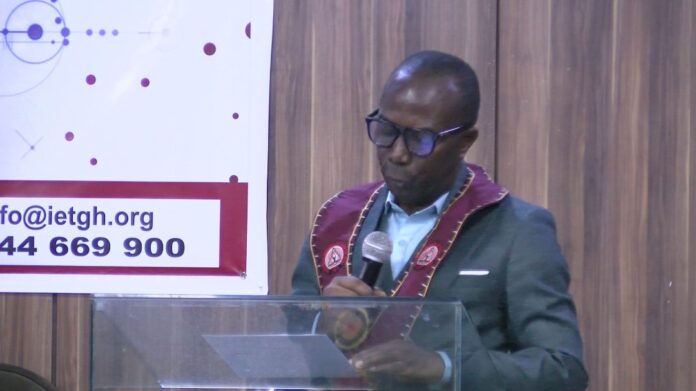On a bright morning in Accra, as sunlight filtered through the windows of the auditorium, a quiet sense of purpose filled the room.
Rows of freshly inducted engineering professionals sat in crisp suits and dresses, eyes attentive, hearts proud.
This was not just another ceremony. It was a moment of reckoning — and at its center stood a man determined to make that clear.
Engr. Henry Kwadwo Boateng, President of the Institution of Engineering and Technology, Ghana (IET-GH), stepped to the podium with the calm authority of a leader seasoned by experience, yet stirred by urgency.
As he welcomed the newest members into the professional fold, it became evident that this induction was more than a rite of passage — it was a call to conscience.
With measured conviction, Engr. Boateng congratulated the new members on their achievement but reminded them that the true weight of their responsibility was only beginning.
“This is not just a ceremony of formality,” he said. “It is a moment of reflection, responsibility, and rededication — not just to your personal advancement, but to the integrity and future of our dear nation.”
Then came the truth — raw, uncomfortable, and necessary.
Ghana, he warned, was not only battling the visible struggles of infrastructure and development.
A more silent, corrosive force threatened its very foundation: corruption and disturbingly, this corruption often festered where engineering and procurement met.
He cited recent examples that had unsettled the public.
Electrical materials procured for the Electricity Company of Ghana, left for years at the port, unaccounted for or deteriorating — even as new ones were still being purchased. COCOBOD, he noted, had expressed concerns over an overstock of jute sacks, unused yet consistently re-ordered.
The question hung heavy in the air: Who was behind this waste? And more critically, were engineering professionals complicit?
The President did not mince words. “As engineering professionals,” he said, “we cannot turn a blind eye.
Many of us are directly involved in procurement, whether on the side of the public entity or the private vendor. Let me make it abundantly clear: we must not compromise our values for personal gain.”
His voice was not anger, but resolute. It was not accusatory, but awakening.
He urged the young engineers before him to hold fast to their moral compass — to be guided not just by skill, but by integrity.
“You are entering a profession,” he said, “that must stand on the pillars of honesty, ethical practice, and moral uprightness.
The future of Ghana depends on engineers who live by integrity.”
As the room listened in silence, the speech transformed from a welcome into a challenge.
Engr. Boateng called on engineers everywhere — not just those in the hall — to speak out, to take interest in the affairs of the nation, and to lead by example.
“Let your work be clean,” he urged. “Let your conscience be clear. Let your name be one that will never be mentioned among the corrupt.”
This was not a moment for applause, but for introspection. These engineers were not just tasked with building bridges and power lines.
They were being asked to rebuild trust, uphold ethics, and reset the moral compass of a profession vital to Ghana’s future.
By the time he concluded, the air in the room had shifted. What began as a congratulatory gathering had become something deeper — a mission.
Engr. Boateng had not simply inducted new engineers that morning. He had lit a fire — the kind that calls people to act, to stand tall, and to remember that in the fight for national integrity, silence is never neutral.
He left them with words not of celebration, but of challenge: “Go out there and prove that engineering with integrity is not just a slogan — it is our identity.” and with that, a new generation of engineers rose — not only to build structures, but to build a nation worthy of their oath.


